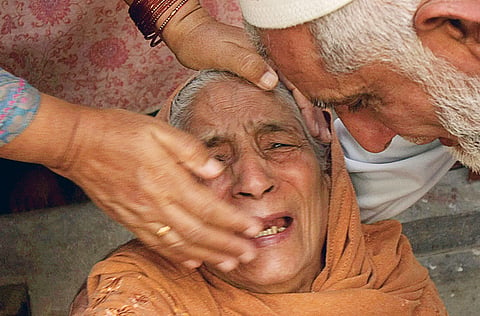Pakistan's enemy within
Country has cause for embarrassment versus some of its neighbours

The two faces of Pakistan's security stood in sharp contrast to each other last Friday. In Karachi, the Pakistan navy boldly announced having carried out an ambitious series of missile and torpedo tests to reaffirm the navy's offensive capability.
But in Lahore, the latest two suicide attacks claimed more than 50 lives when two suicide bombers rammed themselves against two army vehicles. It is impossible to dissociate one of these events from the other.
Indeed, it would be a mistake to assume that Pakistan's mounting internal security challenge can afford an opportunity for the country to even remotely ignore the other part of security. Maintaining a large military is as vital for Pakistan as taking charge of conditions within the country.
Indeed, the success in beginning to reverse the tide of the Taliban, just as in the past year, would not have worked equally well without the clear use of the military to seize back areas such as the northern Swat valley. In fact, events of the past year have squarely demonstrated the need to maintain a very potent military force.
The tough neighbourhood surrounding Pakistan, notably along the country's eastern border with India, also presents a continuing need for maintaining a large military force. With a history of India and Pakistan having fought wars and skirmishes during their 63-year history and the acquisition of nuclear weapons by both sides, complacency of any kind can be literally fatal. Within these parameters, there is no scope for any compromise as far as Pakistan's preparedness for an all-out war is concerned.
What is even more vital for Pakistan's leaders is to begin mobilising the country on a war footing, simply because the country is at war. Nations that have successfully emerged from tight conflict-ridden situations have done so through widespread mobilisation.
Pakistan's worst dilemma is indeed directly the consequence of the character of its ruling elite. Those are indeed the harbingers of vested interests who have exploited Pakistan for themselves without giving much back to the country.
Key indicators
Unsurprisingly, some of the key indicators of national and economic progress often place Pakistan at the bottom of the south Asian pile, notwithstanding its status within the club of states armed with nuclear weapons. From tax collection as a proportion of gross domestic product to the number of those who live below the poverty line, Pakistan's case is cause for embarrassment versus some of its neighbours.
Even a celebrated trend like micro-finance which created Bangladesh's first Nobel Prize winner, professor Mohammad Younus finds proportionately fewer takers in Pakistan. Ironically, Pakistan has no shortage of smart, savvy and credible professionals across different walks of life. The tragedy of Pakistan is vitally that of its inability to translate many of its impressive examples of personal achievement into a source of progressive change and eventual salvation of the country.
On the streets of Pakistan, endless popular lament seeks the moon to overcome the country's challenges. While miraculous turnarounds often take time, there are some basics where Pakistan has failed miserably to the point where its national fabric is in danger of badly fragmenting.
The root of Pakistan's many challenges lies in its failure to enforce the rule of law across the board. Be it the miserable story of criminality tainted police stations or the graft ridden offices of the public and the private sector bodies or indeed the widespread evasion of taxes across Pakistan, there is a common theme running throughout the land.
That common theme is indeed that breaking the law is not just considered a matter of right. It is a source of pride and a way of life which is widely seen synonymous to influence, power and societal respect.
Tragically though, the fight underway today to win back the soul of Pakistan as a tolerant country can still be won. But the compelling question is indeed: is Pakistan's ruling elite now able and willing to appreciate the inevitable need to press ahead with re-establishing the writ of the state to save a country in disarray?
Farhan Bokhari is a Pakistan-based commentator who writes on political and economic matters.


